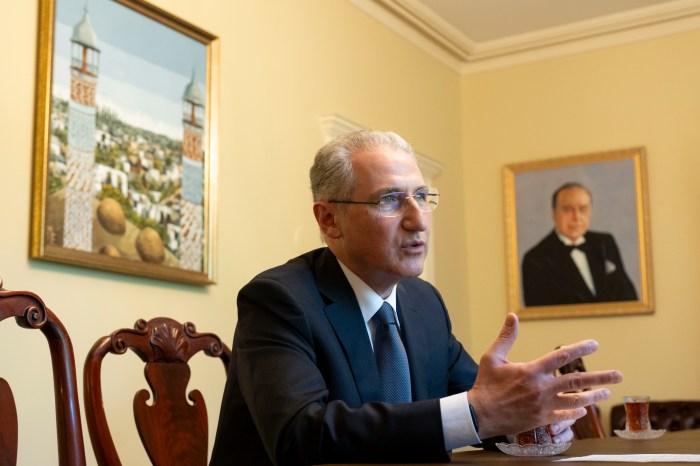I recently attended the Bowery Poetry Club’s “Shevchenko on the Bowery,” a bilingual reading of the poet Taras Shevchenko’s work on Saturday March 10.
If you don’t know who Taras Shevchenko is, you’re probably not Ukrainian. It’s nearly impossible to overstate Shevchenko’s cultural and political importance among the Ukrainian people.
Shevchenko’s life was one of extraordinary artistic talent in the face of loss, slavery, imprisonment, and sickness. Born in 1814 in Ukraine to a family of serfs, he was orphaned by the time he was 11. A local landowner named Pavel Englehardt inherited ownership of him three years later and he became one of Englehardt’s lackeys.
Shevchenko first showed talent not as a poet but as a painter. As a serf painting was not easy; he stole, ran away, and did whatever he had to do to acquire the material and skills required to paint. This was not without its consequences; once, when Englehardt found him painting by candlelight the master beat Shevchenko for risking a fire. Nevertheless, the master saw the young Shevchenko’s potential and managed to find him a teacher.
Shevchenko followed Englehard to St. Petersburg in Russia where prominent artists also noticed his artistic talent, including the most famous painter in Russia at the time, Karl Briulov. Briulov painted a portrait for the specific purpose of selling it off to buy Shevchenko’s freedom. The painting sold, and at 24, in 1838, Shevchenko was officially free from his master.
Though he started as a painter, people began to notice his poetry. Shevchenko’s first book of poems were successful, no doubt in part because they were thoroughly and proudly Ukrainian at a time when Ukrainian was considered a lesser language than Russian. His choice to write in this language was controversial, as was his choice to write about peasant life. Even critics who had favorable opinions about his poetry felt that he was wasting his talent by writing in Ukrainian.
In his poetry, Shevchenko was unsparing in his criticism of those in the establishment, whether nobles, priests, or small landowners, who perpetuated the system of oppression that existed at this time in imperial Russia. His attacks included figures such as Catherine II and Nicholas I. This was not without its consequences; in 1847 the Russian authorities arrested him, put on trial, and sentenced him to hard military service. Tsar Nicholas I specifically requested that Shevchenko be “most strictly guarded and forbidden to write and paint.” Shevchenko’s works were also banned.
Shevchenko was sent to a military prison in Orsk on the border with Kazakhstan. There he suffered under cruel superiors as well as health problems in the form of rheumatism and scurvy. The Russian authorities freed him ten years later but would be hounded by health problems and by continuous police surveillance for the rest of his life. He died at 47, a week before serfdom was abolished in Russia.
At the event you could sense the importance Shevchenko had in the lives of the readers, who included Vasyl Makhno, Svetlana Makhno, Bob Holman, Peter Fedynsky, and Alexander Motyl. Svetlana Makhno’s reading of “If You Young Gentleman But Knew” was reamrkable in that she read the 77 line poem from memory in Ukrainian. Her reading was followed by an English translation read by Bowery Poetry Club owner Bob Holman. In this poem Shevchenko discusses many of the hardships he endured growing up in rural Ukraine, and criticizes other poets for idealizing this life:
“If you young gentleman but knew / how people weep their life away /you would not spin your elegies / and praise God’s name in vain / while laughing at our tears…I don’t know / one vicious thing in this God’s world that doesn’t dwell there.”
Interspersed between the readings were two Musical interludes by Julian Kytasty, who played the Bandura, a Ukrainian folk instrument that looks like a medieval lute.
I asked Peter Fedynsky, one of the readers who is currently at work on a translation of Taras Shevchenko’s poetry, some questions about the poet:
How did you come to know Shecvchenko’s poetry?
Like any Ukrainian I have known about him all my life I don’t remember when or where. But my intimate familiarity came in Moscow of all places. I was the Voice of America Bureau Chief there and I decided I have to learn who this guy was and read his poetry from start to finish. I saw that there was a correlation between what I read and what I saw on the streets of Moscow. He describes the injustice, the pecking order, the vested interests that still exists in Russia and in Ukraine to a lesser degree.
Much of Shevchenko’s Poetry deals with subject matter that seems specific to 19th-century Ukraine. Do you think this makes his poetry less accessible to people in other places?
Shevchenko being Ukrainian doesn’t detract from the universality of his poetry any more than a Goethe being German or Byron being British detracts from their poetry. Yes there is a lot of implicit politics. He offers no prescriptions; he describes what he saw and what he saw was a lot of injustice. He was born a serf and orphaned at a early age and all of this is reflected in his worldview. Millions of Ukrainians including his brother and sister were serfs themselves. He believed that he wouldn’t be free until his people were free. So his cry is a universal cry against tyranny and for the rights of people regardless of their nationality.
Do you have a favorite Shevchenko poem?
To tell you the truth, it’s always the last one I read. I’m not being facetious, but after I read a poem I think “wow this is really great” and I want to share it with everyone. I like every last poem; every one is interesting for various reasons.
“The Heretic” for example is very erudite. There is a lot of history there and it’s a subject you wouldn’t necessarily suspect — he’s talking about John Huss, who was a Czech protestant leader, a historic leader.
“The Lily” is a beautiful poem about a lily who is asking her brother the royal flower why people treated her so badly when she was still a human. It turns out that she was illigitimate; the local landowner had raped her mother and she was persecuted for this. After she turned into a flower, everyone thought how beautiful she was and then they respected her, but then why didn’t that happen in life?
All of his roughly 250 poems tell a little something about human nature.
For more of my interview with Peter Fedynsky, you can visit my personal blog at ecstaticdiscourse.tumblr.com. You can also follow me on twitter at @vmanapat.

















